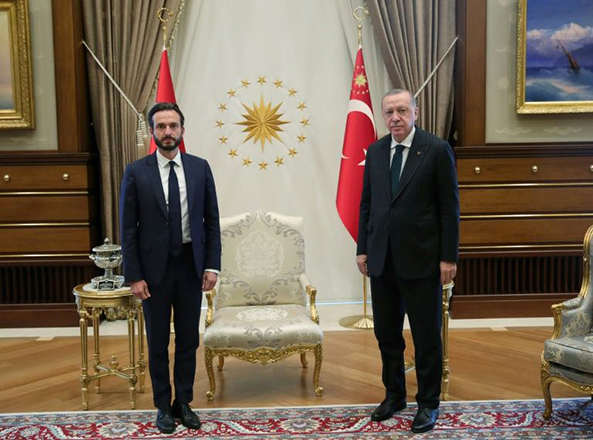- International News
- Friday-2020-09-04 | 02:55 pm

Nayrouz News Agency :
Europe's top human rights judge urged Turkish President Recep Tayyip Erdogan on Thursday to respect the rule of law and comply with court rulings covering political opponents and jailed figures.
The visit by Robert Spano, an Icelandic-Italian who became president of the European Court of Human Rights (ECHR) in May, came despite fears it would lend an air of legitimacy to Turkey's crackdown on media and other freedoms.
The ECHR said Spano stressed to Erdogan "the importance of the rule of law and democracy and in particular... [and] the need to safeguard the independence of the judiciary and freedom of expression".
He also said Turkey was "under a clear obligation to comply with" court rulings because it was a party to the European Convention on Human Rights.
The ECHR ranked Turkey second after Russia on its list of countries with the highest human rights violations recorded in 2019.
On Friday, Spano is due to receive an honorary doctorate from Istanbul University and meet members of the Istanbul bar association.
Erdogan this week accused the bar of turning into a "backyard of terror groups" for unfurling a banner of lawyer Ebru Timtik, 42, who died on the 238th day of a hunger strike she had staged to protest her jailing on terror-related charges.
Erdogan's government has also tightened control of the Internet -- including access to social media -- and has in the past few years shut down television stations and critical outlets.
The P24 press freedom group reports that 92 journalists are behind bars in Turkey today.
The government has additionally jailed tens of thousands of people and sacked more than 100,000 from their state jobs as part of a nationwide crackdown that followed a failed putsch against Erdogan in 2016.
Critics say the focus of the crackdown has gone well beyond alleged coup plotters and is designed to silence dissent in Turkey.
Journalist Mehmet Altan, an economics professor who spent almost two years in prison over alleged links to the failed coup, criticised the top judge's visit in an open letter, calling it ill-timed.
"Under normal circumstances, of course it would be a pleasure to hear that you will be visiting Turkey. Unfortunately that's not the case," he wrote this week.
Emma Sinclair-Webb of Human Rights Watch lashed out at Spano for accepting an honorary doctorate in law from Istanbul University, which "summarily dismissed scores of academics -- among them Mehmet Altan -- in an unlawful way".
Turkey's Human Rights Association called on Spano to also meet civil society groups, saying: "A visit to Turkey under such circumstances solely addressing state institutions may mean that you condone all that has been happening."













